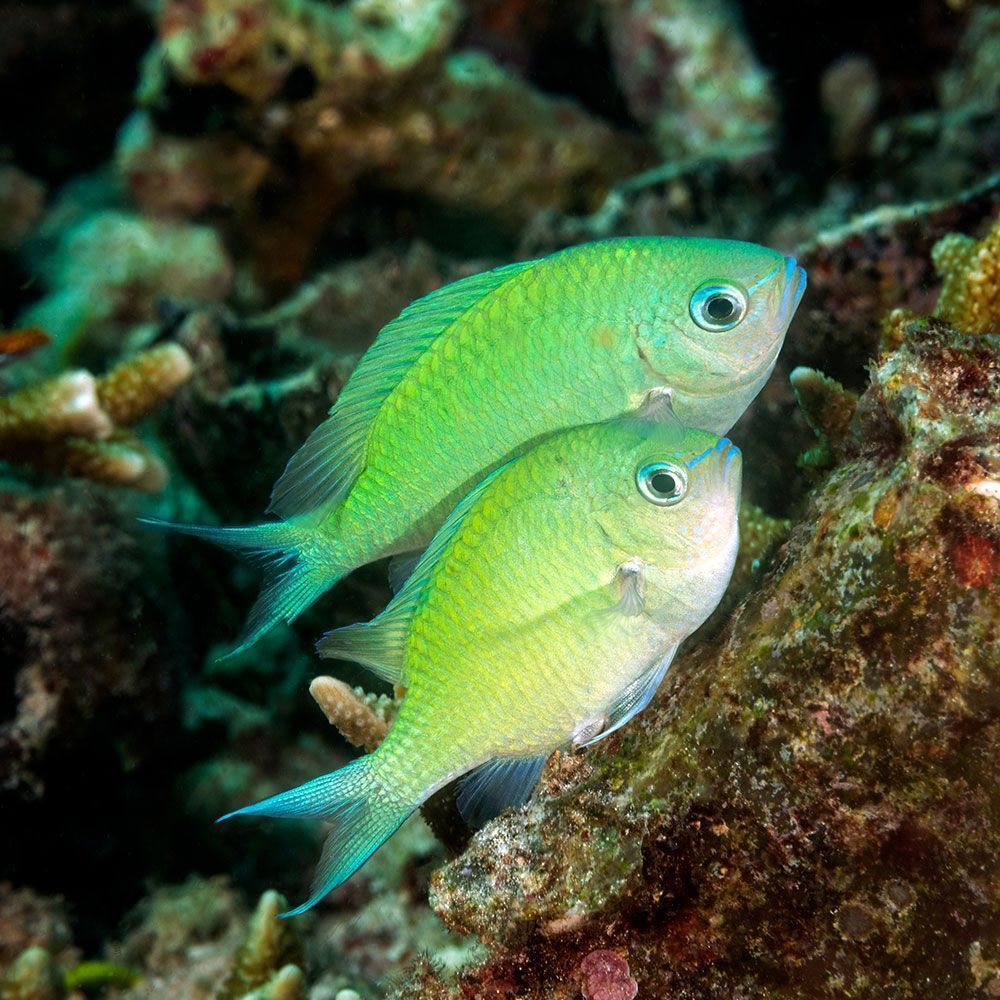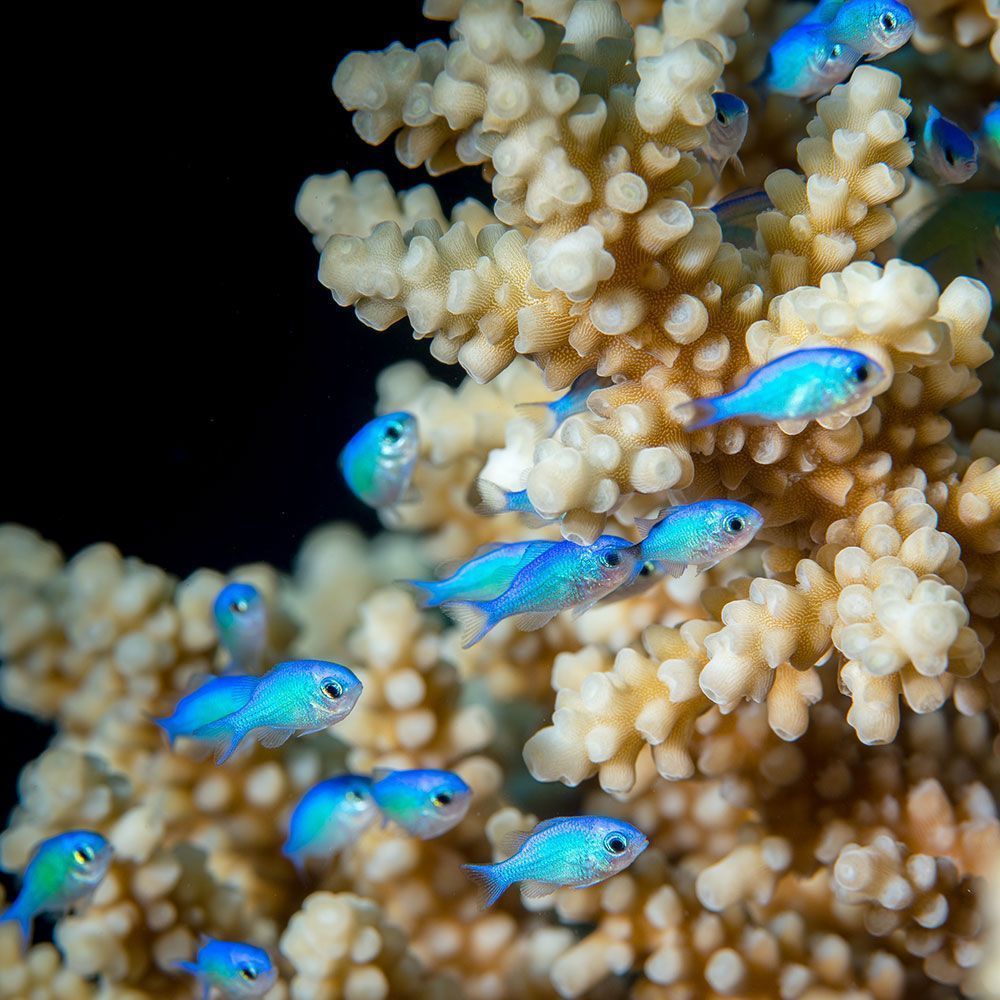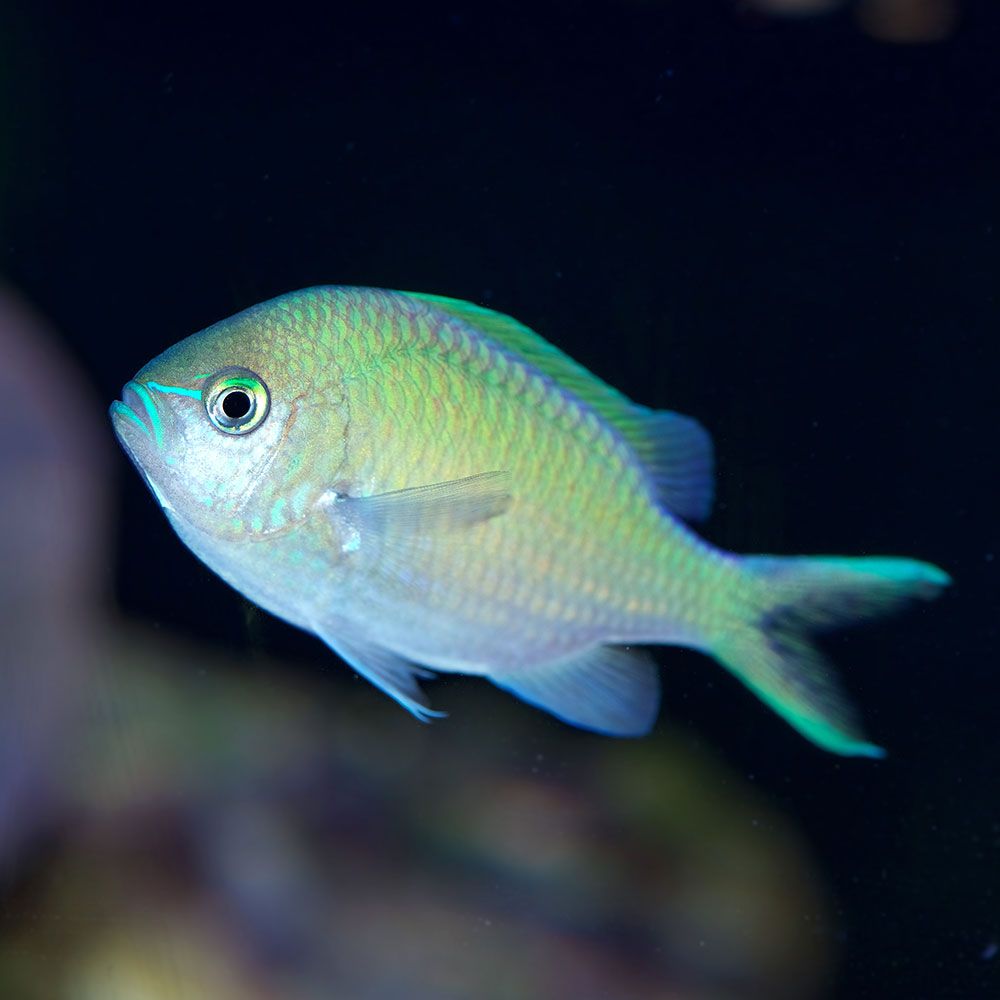If you want some colorful and shimmery saltwater fish, the green chromis can be your best friend.
The species has remained among the most popular fish for over 30 years due to its attractive color and unique personality.
Hailing from the damselfish family, which is known for its aggression, this species, in particular, is recognized for its playful and calm nature.
If you are a beginner looking to stock your first marine aquarium, you are in for a treat!
What is a Green Chromis?
Green Chromis is a saltwater fish that belongs to the Pomacentridae family and is popular for its green color among the aquarium owners.
| Origin | Indo-Pacific: East coast of Africa, Line Island, Tuamotu Archipelago; Ryukyu Islands, The Great Barrier Reef, and New Caledonia |
| Order | Perciformes |
| Family | Pomacentridae |
| Scientific Name | Chromis viridis |
| Common Names | Green chromis, Green puller, Blue-green puller, Blue-green chromis, Green damsel, Blue-green damselfish |
| IUCN Red List Status | Least Concern |
| Appearance | Slender, deep-bodied, forked tail, shimmery and iridescent color, and appears blue or green depending on the light |
| Size | In captivity, up to 7.6-8 cm (3-3.2 in); In the wild, up to 10 cm (3.9 in) |
| Lifespan | In captivity, 8-15 years; In the wild, 3-8 years |
| Temperament | Calm and playful |
| Reef Safe | Yes |
| Tank Level | All levels, but usually middle to top |
| Water Temperature | 72-82 °F (22-28 °C) |
| pH Level | 8.1-8.4 |
| Water Hardness | 8-12 dGH |
| Care Level | Easy |
| Minimum Tank Size | 55 gallons for a group of 6 |
| Tank Environment | Pristine water conditions, enough space for swimming, moderate flow |
| Diet | Omnivorous, planktivorous |
| Tank Mates | Its own group of 6-7; Other peaceful saltwater species |
What is the Natural Habitat of Green Chromis?
The green chromis fish is generally found in tropical and subtropical waters. It is widespread across the Indo-Pacific. In the Indian Ocean, you can find it in the Red Sea.
The fish is also spotted in eastern Africa, the Gulf of Aden, Seychelles, Madagascar, The Persian Gulf, Arabian Sea, Andaman Sea, Persian Gulf, Sri Lanka, Indonesia, and Australia.
The species generally dwell in the lagoons and coral reefs of these water bodies.
This fish is also commonly found in the Pacific Ocean amidst the Gulf of Thailand, China, Philippines, Japan, Taiwan, New Zealand, The Great Barrier Reef, Polynesia, Melanesia, New Caledonia, and Hawaii in the Indo-Pacific parts.
However, reports also suggest that the species are spotted in the Mediterranean Sea as well.
It prefers to inhabit shallow waters but can also be discovered at depths of up to 12 meters.
According to the 2021 assessment of The IUCN Red List Status, the fish is classified as Least Concern.
How to Classify Green Chromis?
The species belong to the Perciformes order and Pomacentridae family. Its binomial name is Chromis viridis; however, it is popularly known as green chromis, green puller, blue-green puller, blue-green chromis, blue puller, green damsel, and blue-green damselfish.
Fun Fact: This is a protogynous fish – it’s always born female, and some of them undergo gender transition into males. This is called protogynous-type hermaphroditism.
How does Green Chromis look?

Now, if this fish has already intrigued you and you want to know more about its habits and physical characteristics, let’s dive right into it!
What is the Size of Green Chromis?
The captive-bred green chromis can usually grow up to a maximum of 7.6-8 cm (3-3.2 in) long.
In the wild, the adult fish can unleash its full potential and reach their maximum size of 10 cm (3.9 in) long.
Some believe that the male and female fish grow up to equal size, i.e., 5 cm (2 in). But others say that dominant males and only females can reach the 8 cm length.
What is the Color of Green Chromis?
The green chromis is renowned for its dazzling and eye-captivating beauty. The color ranges from intense, iridescent green to bluish-green depending on the lighting, hence the name. It also sports a silvery-white patch under the eye.
The green shade of the species is similar to the color of a green apple, while the vibrant blue color tends to shimmer in the light.
During mating, the male fish turns a muted greenish-yellow or completely yellow.
There are a few chromis species that look identical to the green chromis:
- Black Axil Chromis (Chromis atripectoralis): It is an inch larger and has a dark spot that appears grayer in color at the bottom of pectoral fins, unlike the green chromis.
- Yellow Edge Chromis (Chromis multilineal): This has a similar shape to green chromis, however can grow up to 17 cm (6.7 in). It has a muted greenish color with yellow-tipped dorsal fin and a prominent black spot on the pectoral fin area.
What are the Features of Green Chromis?
The green chromis has a slenderyet slightly deep body with no discernible markings. The tail fin has a distinct fork shape that allows it to swim fast and furious.
The fins feature tiny rays and are all transparent. However, the dorsal fins are expansive and stretch from behind the head until before the caudal fins.
It has small, rounded protuberances known as orbital papillae at the back and bottom edges of the orbit of its eyes. This is thought to help minimize turbulence during swimming.
What is the different between a male and a female Green Chromis?
There are no distinct differences between the males and females of this species.
The adult male fish changes its color to yellow and sports a black tail during mating. This color change may not happen in all males. The male also builds small nests in the sand to woo the mature female.
How do Green Chromis behave in the tank?
The green chromis belongs to the damselfish family. But it doesn’t behave like a typical aggressive damselfish.
This species is known for its peaceful nature, avoiding conflicts whenever possible. When kept in a group, it may establish a hierarchy. With plenty of space, aggression and fights can be minimized easily.
Most times, the fish will swim together in a shoal. It prefers the middle of the water column but isn’t hesitant to explore the bottom or surface.
The fish is a robust swimmer, darting back and forth, adding a vibrant burst of color to your aquarium.
The species is reef-compatible, i.e., won’t hurt your corals.
What is the Lifespan of a Green Chromis?
The green chromis has an average lifespan of 3-8 years when left in the wild. In my experience, they can survive for as long as 8-15 years with proper care and maintenance.
How to care for a Green Chromis in the tank?

The green chromis is resilient and thrives in a variety of conditions. But if you want to buy this fish, ensure your pet fish stays healthy with the following essential steps:
What should be the Tank Size for Green Chromis?
Some say 30 gallonsis enough for a single green chromis, but the species thrives well in groups.
Provide them enough space to swim around and explore the surroundings.
So, get a small school of about 6-7 in a marine or reef aquarium. To keep them comfortable, opt for a tank of 55 gallons.
If your goal is to set up a mixed-species tank, it’s always better to invest in a bigger tank depending on several tank mates and their needs.
Otherwise, a cramped tank leads to unnecessary stress and makes water quality maintenance hard. Additionally, in smaller tanks, there’s a higher likelihood of aggression among the fish in the school.
What should be the Water Chemistry for Green Chromis?
To help your green chromis buddies thrive in captivity, it is advisable to maintain the following water conditions – which are similar to its preferred coral-filled lagoons.
- pH Levels: 8.1-8.4
- Water Temperature: 72-82 °F (22-28 °C)
- Water Hardness: 8-12 dGH
- Ammonia: 0 ppm
- Nitrite: 0 ppm
- Nitrate: Below 10 ppm
- Synthetic Salt Level: 26-33 ppt
- Specific Gravity: 1.020-1.025
What should be the Tank Environment for Green Chromis?
If you’re all set with the tank and water, your next task is to replicate its natural environment. Let’s see how you can design the best for your fish and keep them happy and healthy.
Which Substrate is needed for Green Chromis?
All types of substrate are fine for this species. However, some suggest using a sandy substrate and avoiding soil.
If you have any coral in the tank, choose a substrate suitable to its preferences.
Which Plants are needed for Green Chromis?
There are no specific plant type requirements for this species. It’s better to choose any plant that is compatible with saltwater aquariums.
Make sure you have plenty of plants for algae growth, as fish love to nibble and graze on them.
Which Lighting is needed for Green Chromis?
The green chromis do not have very specific requirements when it comes to lighting. If you keep it in a reef tank, make sure you use regular reef lighting – which has low to moderate intensity. Just make sure the lighting is well-timed with a good day-night cycle.
According to some, you must use low and dim lighting as the fish can’t tolerate excess lighting.
What Décor is needed for Green Chromis?
This chromis likes to stay in the protection of rocky outcrops and reefs as it does not harm corals.
It is pretty compatible with the Acroporal coral head. You can also use small polyp stony (SPS) branching corals.
You must also implement a lot of rockworks, caves, and cracks in your tank to offer plenty of hiding spaces.
Ensure to keep the top and the middle of the tank fairly less cluttered, as it needs a lot of swimming space.
What Filtration is needed for Green Chromis?
The green chromis is particularly sensitive to nitrate and ammonia. Especially if you’ll keep a larger group of these fish, the water can get sour pretty quickly.
Install a solid and powerful filtration system to keep everything in check. Otherwise, your fish may attract diseases.
Based on the type of tank, you must also follow the following water change routines:
Fish-only tank
- Up to 40 gallons: 5% biweekly changes
- Above 40, until 90 gallons: 15% biweekly changes
- Bigger than 90 gallons: 10% biweekly or 20% monthly – only when the water is stable
Reef tank
- Up to 40 gallons: 15% biweekly changes
- Above 40, until 90 gallons: 20-30% biweekly changes
- Bigger than 90 gallons: 20-30% every 6 weeks – only when the water is stable
What is the Water Flow Rate for Green Chromis?
The fish does not seem to have any major preferences when it comes to water currents. However, try to be a little careful and make sure that the current is not too strong to keep the fish safe.
You must always keep low to medium water flow in your tank.
Fish Care Tip: Don’t let your tank temperature reach 87 °F (31 °C).
What type of food do Green Chromis eat?
The green chromis is generally omnivorous. It feeds on a wide range of food sources in the wild, so ensure variety in their diet. The species is also planktivorous in the wild and feeds and forages the tank for more food constantly.
Invest in vitamin-rich food to help the fish show its brightest colors. It loves to munch on high-protein food. Keep them on a diet of:
- Larvae
- Tiny shrimps
- Algae
- Dry flakes
- Pellets (soak them to avoid digestive issues)
- Krill
- Copepods
- Zooplankton
- Phytoplankton
- Finely chopped fresh vegetables
- Meat
- Frozen food
- Fish eggs
- Morsels
- Plant leaves
Remember to feed the fish in small portions at least 2-3 times a day for proper nourishment. Also, immediately remove any leftovers from the tank to prevent the water from contaminating.
Feeding Tip: Watch all of your specimens carefully to check whether all of them got their share. Mealtimes are also the best moment to notice whether any fish is getting bullied.
Which Tank Mates are needed for Green Chromis?
The green chromis prefers to stay in groups, and you should have at least 6-7 of them together. Many aquarists like to keep them in odd numbers.
It’s better to avoid keeping smaller groups to prevent any damage to the weaker ones. Larger groups minimize the aggression.
Apart from their species, they are compatible with other peaceful saltwater species. If you want your fish to make some friends, try these species:
- Clownfish
- Basslets (royal gramma)
- Butterflyfish
- Yellow watchman goby
- Blennies (bicolor blenny)
- Dartfish
- Assessors
- Fairy wrasses
- Gobies
Some compatible non-fish species are:
- Starfish
- Oysters, clams, scallops
- Shrimps, snails, crabs
- Polyps and corals
- Anemones
- Sea fans and gorgonians
- Sponges and tunicates
While housing your chromis with other species, regularly monitor your tank. If your chromis are being bullied, they will normally spend most of their time in the top corner of the tank. If you notice this, you need to take action immediately.
Which Tank Mates to Avoid for Green Chromis?
In general, avoid keeping green chromis with large and predatory fishes. Otherwise, your pet may get bullied or eaten. To protect your little fish, avoid these species:
- Anthias
- Dwarf angels
- Tangs
- Large wrasses
- Lionfish
- Groupers
- Soapfish
- Seahorses
- Pipefish
What are the Common Diseases in Green Chromis?
Green Chromis are fairly delicate species, but they don’t usually get major diseases. But if not taken proper care of, they can get sick. So, be prepared to deal with the most common ones in the table below:
| Disease Name | Causes | Symptoms | Treatment |
|---|---|---|---|
| Marine Ich | Protozoan Parasitic Infection | Appetite loss, white spots, flashing, inactivity | Raise water temperature and add aquarium salts or ich medication |
| Fish Tuberculosis | Mycobacterial Infection | Weight loss, scale loss, ulcerations, poor appetite, and often a history of reproductive problems | Antibiotics, 25-40% water change every 14 days |
| Fin Rot | Bacterial Infection | Loss of appetite, Fraying and/or disintegration of fins, lethargy, fin discoloration | Increase the water temperature, add ich medications or aquarium salts |
| Pop Eye Disease | Fluid build-up | Protrusion of eyeballs, stretching of the eye socket, discolored or bloody eyeballs, cloudiness, inactivity, loss of appetite, behavioral changes | Antibiotics, regular water change, add aquarium salts |
| Columnaris | Bacterial Infection | Gray/white patches, fin fraying, lethargy, appetite loss | Improve water quality, administer antibiotics, reduce stress |
| Uronema Marium | Parasitic Infection | Red sores | Quarantine, treat with medicines containing metronidazole, acriflavine, and copper Difficult to treat |
| Marine Velvet | Dinoflagellate Parasite | Small powdery white grains all over fish’s body, rapid breathing, flashing, scratching, cloudy eyes, | Quarantine in non-reef tank and treat with copper sulphate medicines |
Most of these diseases can be avoided and prevented if you:
- Monitor water parameters regularly
- Change water as recommended
- Quarantine before adding to the main tank as they might carry parasites.
How to breed Green Chromis in an aquarium?
Some experienced aquarists successfully bred the green chromis in home aquariums, but the breeding process is not easy. It requires specific conditions for spawning. So, if you want to try your hand at breeding the fish, here are some things you need to know.
What is the Tank Preparation for Green Chromis?
Some specimens spawn spontaneously in community tanks. But it’s important to create a safe environment for breeding.
To enhance the chances of successful reproduction, move a breeding group to a separate 55 or 60-gallon tank. This will prevent the eggs from being eaten by other species like wrasses, crabs, and serpent stars.
You can better control factors like temperature and light in a separate aquarium. These play a crucial role in stimulating fish to breed.
Blue-green chromis, like clownfish, tend to spawn optimally within a temperature range of 79-83°F (26-28°C) on an algae mat composed of sand, rubble, or sponge.
How to form a Mating Group for Green Chromis?
Green chromis don’t form life-long monogamous bonds. Instead, it’s ideal to let your green chromis mate in groups. This also increases the chances of spawning.
So, house one male with at least two and at most ten females.
What is the Mating process for Green Chromis?
If there are no predators, the male may turn yellow. He also becomes territorial and aggressive during the breeding period, so careful monitoring is necessary.
The male establishes his territory beneath or beside the school of green chromis on the seabed. He engages with a female and encircles her. If she is receptive, she follows him to his spawning site.
There, the male rubs his genital papillae on the algal mat. The egg-scattering female mimics him and lays her eggs all over. The male then releases sperm into the eggs externally.
The male repeats this process with other females until his nest is full.
The total number of eggs per spawning ranges from 1,300-1,500. Each egg has about 0.6 to 0.66 mm in length and 0.42-0.49 mm in width.
Furthermore, the eggs are adhesive, and hence, it’s better to keep the tank bottom free from any substrate.
Incubation & Fry Development
After fertilization, the male cares for the nest and safeguards and ventilates the eggs until they hatch.
When do Green Chromis eggs hatch?
Depending on the water temperature, the eggs typically hatch within 2 to 3 days. The larvae undergo a developmental stage lasting from 17 to 47 days.
Once hatched, the fry require a diet rich in fat and protein to ensure proper development. Any unfertilized or unhatched eggs are typically consumed by the male.
When to separate adult Green Chromis from the fry?
Once the chromis eggs hatch, it’s essential to remove the adult fish to prevent them from consuming the newly hatched fry.
You can also transfer the hatched fry to a separate tank to increase their chances of survival.
Breeding Tip: This species is easy to breed; however, fry needs to be monitored for around 2 months for healthy development.
How to buy Green Chromis?
- Buy juvenile fish of 1-2 inches long from the same tank. They are well accustomed to each other and won’t get as aggressive. Bigger ones may be much more aggressive and kill each other.
- Buy a shoal of six at a time as it is relatively inexpensive.
- Check for visible signs of stress and disease, like cloudy eyes, injured fins, heavy breathing, and redness. If any, avoid those specimens.
A word from FishInAquarium
Green chromis is relatively easy to care for.The docile, hardy, and reef-safe fish are an excellent choice even for marine community tanks.
And when you see an entire shoal of them exhibiting bold and active behaviors, you’ll be captivated beyond words!
Now, if you’re satisfied with this care guide, make sure you share this with other enthusiasts. Let them also join in the joy of owning these pets.
Or, if you face any roadblocks, be sure to reach out to us, drop a mail, and we’ll be more than happy to help you!


